Judging
[|Printable One-Page Guide to Judging]
(How to use online ballots, link accounts, and submit results and comments)
If you are a judge, you can use online ballots, update your paradigm, enter your competitor/school conflicts, or offer yourself for hired judging at a tournament.
In order to use many of these features, you must first "link" your Tabroom account to your school's judge entry. See the section on Your Account for instructions on how to link your account to a judge.
Current Tournament Assignment and Ballots
Once you have linked your account to a judge entry, you can access your current tournament assignment and ballots, and have enabled live updates and online ballots.
To see your current ballots, log-in and go to your account dashboard by clicking your username/email in the upper part of the page. If you have any current ballots, you should see a list. Make sure to click "Enter Ballot" or whichever text appears on screen to let the tournament know that you're aware you're judging, arrive at your room, and/or the round is set to begin.
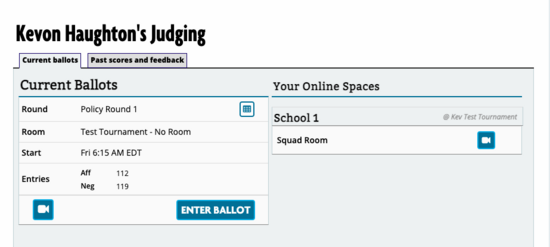
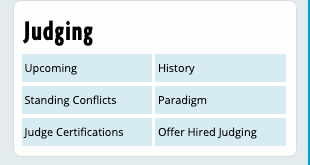
Upcoming – displays tournaments you will be judging at in the future.
History – displays tournaments you have judged at in the past.
Standing Conflicts – allows you to enter students and/or schools you are conflicted from judging. How to complete this will be explained below.
Paradigm – allows you to enter your judge paradigm/philosophy, which will be publicly available for competitors to read before the competition.
Offer Hired Judging Rounds – allows you to offer additional rounds at tournaments you’re not currently entered to judge at.
Online Ballots

Judge – Displays the judge’s name. This should be your name.
Round – Displays the round you are assigned to judge.
Room – Displays the room should be judging in. If this is a name/number, then it is an onsite location. If it is a blue camera, it is a virtual competition space.
Starts – Displays the time the round is scheduled to start. The top value displays the time in your time zone. The bottom value displays the time in the tournament’s time zone.
Entries – Displays the competitors/codes that should be in that room.
Start Button (Green) – Press this button once you receive your ballot, arrive at the room, and/or the round is set to begin.
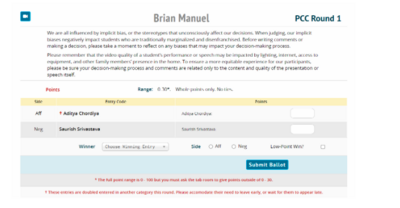
Top Left – Displays the onsite or virtual room you’re assigned. If it’s a blue icon, it means this is a virtual room.
Top Center – Displays the name of the judge
Top Right – Displaces the event and round number of the assigned debate. Be sure this matches the correct round you’re currently judging because some tournaments release more than one round at a time.
Diversity Statement – this is the default diversity and equity statement on all NSDA ballots. Be sure to take the time to read it and become informed on a judge’s implicit bias.
Points – Displays the point scale for the tournament and what level of sub points you can provide to each competitor. If you enter points that fall outside of the range, you will not be allowed to submit your ballot and an error message will appear.
Side – Displays who is the aff/pro/gov or neg/con/opp in each round. In flip for sides debates if your ballot looks incorrect based on the sides that are being debated, please refresh your ballot.
Entry Code – Names and/or Codes of the competitors in the room. Double-check to ensure you have the right competitors before starting your round.
Points – Enter the points you assign to each individual based on this performance. Points are always enabled in each event.
Winner – Choose the winning competitor/team in the debate from the dropdown menu.
Side – Choose the side of the winning competitor/team. Make sure it corresponds to the team you chose in the dropdown menu.
Low Point Win? – Check this box if you intentionally meant to give the winning team lower points than the losing team.
Submit Ballot – Select this option when you believe you’ve correctly entered the information request above and are ready to submit your decision. Below this box are instructions to help you complete your ballot.
Updating Your Paradigm
See the section on Paradigms for information on how to upload/update your paradigm.
Entering Conflicts
Tabroom allows you to put in "standing" conflicts that will apply at any tournament you enter as a judge. Conflicts are meant to reflect a personal or professional relationship which means it is unfair for you to judge the other person; such as a relative, or a former student. Do NOT use conflicts against debaters you simply do not like, or the tournament directors of tournaments you attend will likely get very angry.
For the automatic conflict to work, the person you want to conflict yourself against must have a Tabroom account.
From your account dashboard, click the link for "Conflicts" on the sidebar:
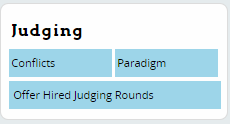
You can then search for a person or school to conflict:
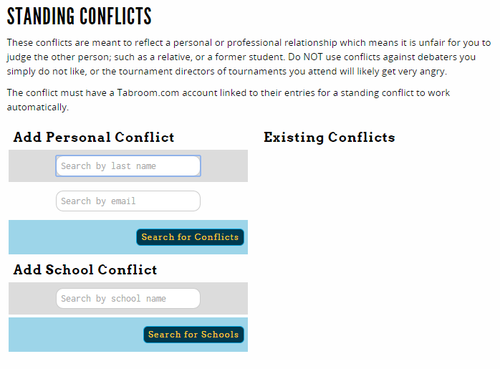
If any results are found, they will appear in a list next to the search box. Just click the "Conflict" button next to the search result:
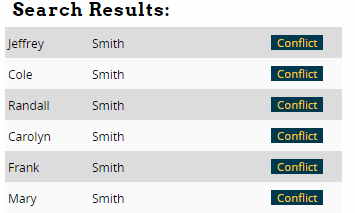
Once you have added a conflict, they will appear in your "Existing Conflicts" list:
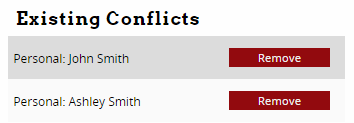
To remove an existing conflict, click the red "Remove" button next to their name.
Competitor Feedback
Competitor feedback can be found underneath your ballot. You should always submit your ballot first and then fill out your reason for decision and feedback for each competitor.
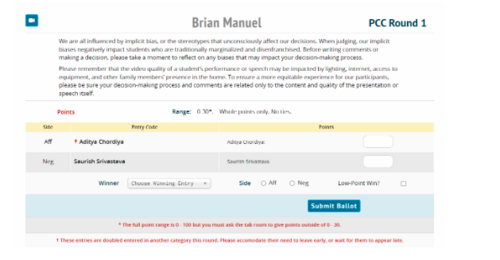
Reason for Decision – Comments go to all competitors in the round. You should summarize your reason for voting for one team over another. Once complete, hit “save feedback” and proceed.
Competitor Feedback – Select the tab for the specific competitor you wish to leave feedback for and enter it in the box. These comments can only be seen by the competitor they are intended for. Once complete, hit “save feedback” and proceed.
Offer Hired Judging
Many tournaments use Tabroom to manage their hired judging. Note that offering yourself as a judge does NOT mean you will automatically be hired or paid - the tournament must still approve your offered rounds, and then another attendee must claim them. You will not be paid for unclaimed rounds. Tabroom will notify you as your hired rounds are approved and claimed.
If you need to reduce your hired rounds after they have been claimed, you must contact the program who claimed your rounds to reduce the claim. It is not possible to reduce your claim yourself.
To offer yourself as a hired judge at an upcoming tournament with this feature enabled, click the "Offer Hired Judging Rounds" link in the Sidebar.
You will see a list of upcoming tournaments, with an "Offer" button for each one:
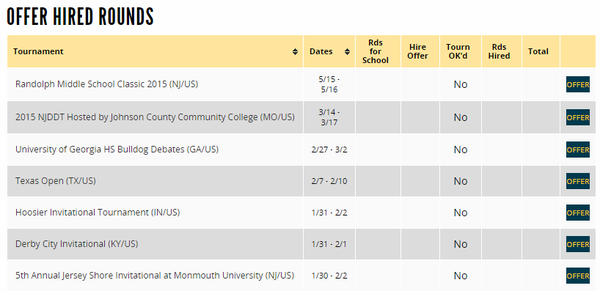
After clicking the Offer button, you will be asked how many rounds you are offering:

Fill out a number and click "Offer" - you will then be notified whenever your rounds are approved or claimed.